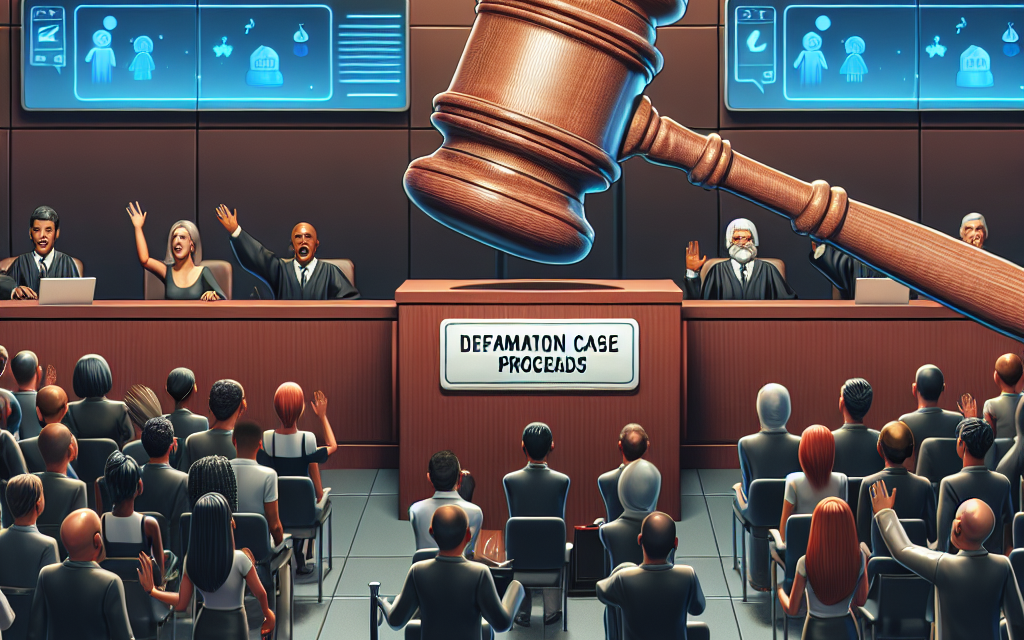“Justice Served: Appeals Court Orders Fox to Face Smartmatic’s Defamation Challenge.”
Introduction
A recent ruling by an appeals court has mandated that Fox News must face a defamation lawsuit filed by Smartmatic, a voting technology company. The court’s decision underscores the legal complexities surrounding media accountability and the dissemination of false information, particularly in the context of the 2020 presidential election. Smartmatic alleges that Fox News propagated false claims about the company’s involvement in election fraud, which the company argues has caused significant reputational harm. This ruling not only highlights the ongoing legal battles over election-related misinformation but also sets a precedent for how media organizations may be held accountable for their reporting practices.
Appeals Court Decision Explained
In a significant development within the realm of media law, an appeals court has ruled that Fox News must confront the defamation case brought against it by Smartmatic, a voting technology company. This decision underscores the ongoing legal battles surrounding the dissemination of information in the context of the 2020 presidential election, particularly regarding claims of election fraud. The appeals court’s ruling is pivotal, as it not only allows Smartmatic’s case to proceed but also sets a precedent for how media organizations handle allegations of misinformation.
The court’s decision came after Fox News sought to dismiss the lawsuit, arguing that its coverage was protected under the First Amendment, which guarantees freedom of speech and the press. However, the appeals court found that the allegations made by Smartmatic warranted further examination in a court of law. Specifically, the court noted that if Fox News knowingly published false information or acted with reckless disregard for the truth, it could be held liable for defamation. This aspect of the ruling is particularly crucial, as it highlights the responsibilities that media outlets have in ensuring the accuracy of their reporting, especially when it pertains to significant public events such as elections.
Moreover, the appeals court’s ruling emphasizes the importance of accountability in journalism. In an era where misinformation can spread rapidly through various channels, the decision serves as a reminder that media organizations must adhere to rigorous standards of truthfulness. The court’s stance suggests that the line between opinion and fact must be clearly delineated, particularly when the implications of false reporting can have far-reaching consequences for individuals and organizations alike. As such, the ruling may encourage other media entities to reassess their editorial practices and the potential ramifications of their reporting.
In addition to the implications for Fox News, the appeals court’s decision could have broader ramifications for the media landscape as a whole. As more companies and individuals seek legal recourse for perceived defamation, the legal standards surrounding such cases may evolve. This could lead to a more cautious approach among media outlets, as they navigate the complexities of reporting on contentious issues. The ruling may also embolden other plaintiffs who feel wronged by media coverage, potentially resulting in an increase in defamation lawsuits.
Furthermore, the case highlights the ongoing tensions between media freedom and the need for responsible journalism. While the First Amendment provides robust protections for free speech, it does not grant immunity for false statements that can harm reputations. The appeals court’s decision reinforces the notion that media organizations must balance their right to report with their obligation to provide accurate information. This balance is particularly critical in politically charged environments, where misinformation can undermine public trust in democratic processes.
As the case moves forward, it will be essential to observe how Fox News responds to the court’s ruling and what strategies it employs in its defense. The outcome of this case could not only impact Fox News but also shape the future of media accountability and the standards by which defamation cases are judged. Ultimately, the appeals court’s decision serves as a crucial reminder of the vital role that truth plays in journalism and the potential consequences of failing to uphold that standard. As the legal proceedings unfold, the implications for both the media industry and public discourse will continue to be closely monitored.
Implications for Fox News
The recent ruling by an appeals court mandating that Fox News confront Smartmatic’s defamation case carries significant implications for the media giant, particularly in the context of its reputation and operational practices. This decision underscores the legal vulnerabilities that media organizations face when disseminating information that may be misleading or false, especially in politically charged environments. As the case progresses, Fox News must navigate the complexities of defamation law while also addressing the broader ramifications of its reporting on the 2020 presidential election.
One of the most immediate implications of this ruling is the potential financial liability that Fox News could incur if Smartmatic’s claims are upheld. Defamation cases can result in substantial damages, particularly when the plaintiff can demonstrate that the defendant acted with actual malice or reckless disregard for the truth. Given the high-profile nature of the allegations against Fox News, the stakes are particularly high. A ruling against the network could not only lead to significant monetary penalties but also set a precedent that may embolden other entities to pursue similar legal actions against media organizations.
Moreover, the ruling may compel Fox News to reassess its editorial policies and practices. In light of the court’s decision, the network may need to implement more stringent fact-checking protocols and editorial oversight to mitigate the risk of future defamation claims. This could involve a reevaluation of how information is sourced and presented, particularly in relation to contentious political narratives. By adopting a more rigorous approach to reporting, Fox News could not only protect itself from legal repercussions but also enhance its credibility among viewers and stakeholders.
In addition to the legal and operational implications, the ruling also poses a reputational challenge for Fox News. The ongoing litigation serves as a reminder of the scrutiny that media organizations face in an era where misinformation is rampant. As public trust in media continues to wane, the outcome of this case could further erode confidence in Fox News, particularly among those who view the network as a purveyor of partisan narratives. The perception of bias and irresponsibility in reporting could alienate segments of the audience, potentially impacting viewership and advertising revenue.
Furthermore, the case highlights the broader landscape of media accountability in the digital age. As social media platforms and alternative news sources proliferate, traditional media outlets like Fox News are increasingly held to account for their reporting. The Smartmatic case exemplifies the challenges that arise when media organizations prioritize sensationalism over accuracy. In this context, the ruling serves as a cautionary tale for all media entities, emphasizing the importance of responsible journalism in maintaining public trust.
As the legal proceedings unfold, Fox News will undoubtedly face mounting pressure to address these implications head-on. The network’s response to the ruling will be closely monitored by legal experts, industry analysts, and the public alike. Ultimately, how Fox News navigates this defamation case could have lasting effects not only on its own operations but also on the media landscape as a whole. The outcome may influence how other media organizations approach their reporting practices, potentially ushering in a new era of accountability and transparency in journalism. In this way, the implications of the appeals court’s ruling extend far beyond the confines of the courtroom, shaping the future of media integrity and public discourse.
Smartmatic’s Legal Strategy
In the ongoing legal battle between Smartmatic and Fox News, the appeals court’s recent ruling has significant implications for the defamation case brought forth by Smartmatic. This decision underscores the importance of the legal strategies employed by Smartmatic as it seeks to hold Fox accountable for its alleged dissemination of false information regarding the voting technology company. Smartmatic’s legal team has meticulously crafted a strategy that not only aims to prove defamation but also seeks to highlight the broader consequences of misinformation in the media landscape.
At the heart of Smartmatic’s legal strategy is the assertion that Fox News knowingly spread false claims about the company’s role in the 2020 presidential election. By focusing on specific statements made by Fox hosts and guests, Smartmatic aims to demonstrate that these claims were not only unsubstantiated but also maliciously intended to damage the company’s reputation. This approach is critical, as defamation cases require the plaintiff to establish that the statements in question were made with actual malice, a standard that can be challenging to meet. However, Smartmatic’s legal team has gathered extensive evidence, including internal communications and public statements, to support their claims of malice.
Moreover, Smartmatic’s strategy extends beyond merely proving defamation; it also seeks to address the broader implications of misinformation in the media. By framing the case within the context of the public’s trust in electoral processes and the integrity of voting technology, Smartmatic aims to position itself as a defender of democratic values. This narrative not only strengthens their legal argument but also resonates with a wider audience concerned about the impact of false information on public perception and electoral integrity. In this way, Smartmatic’s legal strategy is not just about seeking damages; it is also about advocating for accountability in media practices.
In addition to its focus on the content of the statements made by Fox, Smartmatic’s legal team has also emphasized the context in which these statements were made. By highlighting the environment of fear and uncertainty that surrounded the 2020 election, Smartmatic seeks to illustrate how Fox’s actions contributed to a climate of misinformation that had real-world consequences. This contextual approach is crucial, as it allows the court to understand the broader ramifications of Fox’s reporting, thereby reinforcing Smartmatic’s claims of harm.
Furthermore, the appeals court’s ruling that Fox must confront Smartmatic’s case is a pivotal moment in this legal saga. It not only validates Smartmatic’s claims but also sets a precedent for how similar cases may be handled in the future. The ruling signals to other media organizations that they may be held accountable for the accuracy of their reporting, particularly when it comes to sensitive topics such as election integrity. This potential shift in the legal landscape could encourage more responsible journalism and deter the spread of misinformation.
As Smartmatic continues to navigate the complexities of its defamation case against Fox News, its legal strategy remains focused on establishing the truth behind the false claims made against it. By combining a robust legal argument with a broader narrative about the importance of accurate reporting, Smartmatic is not only fighting for its own reputation but also advocating for the integrity of the democratic process. The outcome of this case could have lasting implications, not only for Smartmatic but also for the media industry as a whole, as it grapples with the challenges posed by misinformation in an increasingly polarized environment.
Defamation Law in Focus
In a significant development within the realm of defamation law, an appeals court has ruled that Fox News must confront the defamation case brought against it by Smartmatic, a voting technology company. This ruling not only underscores the complexities of defamation law but also highlights the increasing scrutiny media organizations face regarding their reporting practices, particularly in the context of high-stakes political events. The case revolves around allegations that Fox News disseminated false information about Smartmatic’s role in the 2020 presidential election, suggesting that the company was involved in a conspiracy to manipulate election results.
Defamation law, which seeks to balance the protection of individual reputations with the freedom of speech, becomes particularly intricate in cases involving public figures and matters of public concern. In this instance, Smartmatic, as a corporation, is classified as a public figure, which necessitates a higher burden of proof to establish defamation. Specifically, Smartmatic must demonstrate that Fox acted with “actual malice,” meaning that the network either knew the information was false or acted with reckless disregard for the truth. This standard, established by the landmark Supreme Court case New York Times Co. v. Sullivan, serves to protect robust debate and discussion in the public sphere, yet it also poses significant challenges for plaintiffs in defamation cases.
As the legal proceedings unfold, the implications of the appeals court’s decision extend beyond the immediate parties involved. The ruling serves as a reminder of the responsibilities that come with journalistic freedom, particularly in an era where misinformation can spread rapidly and have far-reaching consequences. Media organizations are tasked with the critical role of informing the public, yet they must also navigate the potential legal ramifications of their reporting. This case exemplifies the tension between the need for a free press and the necessity of accountability for disseminating false information.
Moreover, the Smartmatic case is part of a broader trend in which technology companies and other entities are increasingly willing to challenge media outlets over perceived inaccuracies. This shift reflects a growing awareness of the power dynamics at play in the information age, where reputations can be damaged by unverified claims and sensational reporting. As such, the outcome of this case may set important precedents for future defamation claims, particularly those involving media coverage of elections and political discourse.
In light of these developments, it is essential to consider the potential ramifications for both media organizations and the public. If Smartmatic succeeds in its case against Fox, it could embolden other companies and individuals to pursue similar legal actions, thereby reshaping the landscape of defamation law. Conversely, a ruling in favor of Fox could reinforce the protections afforded to media outlets, allowing them greater latitude in their reporting on contentious issues.
Ultimately, the appeals court’s decision to allow Smartmatic’s defamation case to proceed serves as a pivotal moment in the ongoing dialogue about the responsibilities of the press and the legal standards governing defamation. As the case progresses, it will undoubtedly draw attention not only from legal scholars and practitioners but also from the public, who are increasingly aware of the implications of media accuracy in a democratic society. The outcome will likely resonate far beyond the courtroom, influencing how media organizations approach their reporting and how individuals and companies seek redress for reputational harm in the future.
Impact on Media Accountability
The recent ruling by an appeals court mandating that Fox News confront Smartmatic’s defamation case has significant implications for media accountability in the United States. This decision underscores the growing scrutiny that media organizations face regarding the accuracy and integrity of their reporting, particularly in an era characterized by rampant misinformation and polarized political discourse. As the legal battle unfolds, it raises critical questions about the responsibilities of media outlets in ensuring that their broadcasts do not propagate falsehoods that can harm individuals or organizations.
In this context, the Smartmatic case serves as a pivotal moment for the media landscape. Smartmatic, a voting technology company, alleges that Fox News disseminated false information about its role in the 2020 presidential election, suggesting that the company was involved in a conspiracy to manipulate election results. The appeals court’s ruling not only allows the case to proceed but also highlights the potential consequences for media entities that prioritize sensationalism over factual reporting. This situation illustrates the delicate balance that news organizations must maintain between the pursuit of ratings and the obligation to provide accurate information to the public.
Moreover, the ruling may set a precedent for future defamation cases involving media companies. If Smartmatic succeeds in its claims, it could embolden other organizations and individuals to pursue legal action against media outlets that they believe have misrepresented their actions or reputations. This potential shift could lead to a more cautious approach among journalists and news producers, who may feel compelled to verify their sources and claims more rigorously to avoid legal repercussions. Consequently, this heightened accountability could foster a more responsible media environment, where the dissemination of false information is met with tangible consequences.
Additionally, the case reflects broader societal concerns regarding the role of media in shaping public perception and discourse. In an age where misinformation can spread rapidly through social media and other platforms, the responsibility of traditional media outlets to uphold journalistic standards becomes even more critical. The Smartmatic lawsuit serves as a reminder that media organizations are not immune to the repercussions of their reporting. As the public increasingly demands transparency and accountability from news sources, the outcome of this case could influence how media companies approach their reporting practices in the future.
Furthermore, the implications of this ruling extend beyond the immediate parties involved. It invites a larger conversation about the ethical obligations of media organizations in a democratic society. The ability of the press to inform the public is foundational to democracy, yet this responsibility comes with the duty to report truthfully and fairly. As the legal proceedings progress, stakeholders in the media industry will be closely monitoring the developments, as they may signal a shift in how defamation cases are handled and how media accountability is enforced.
In conclusion, the appeals court’s decision requiring Fox News to confront Smartmatic’s defamation claims is a significant moment for media accountability. It emphasizes the need for media organizations to prioritize accuracy and integrity in their reporting, particularly in a climate where misinformation can have far-reaching consequences. As this case unfolds, it may not only reshape the legal landscape for media defamation but also encourage a more responsible approach to journalism, ultimately benefiting the public and the democratic process. The outcome will likely resonate throughout the media industry, influencing how news is reported and consumed in the years to come.
Future of Election-Related Litigation
The recent ruling by an appeals court mandating that Fox News confront Smartmatic’s defamation case marks a significant moment in the ongoing landscape of election-related litigation. This decision not only underscores the legal ramifications of misinformation in the media but also sets a precedent for how similar cases may unfold in the future. As the nation grapples with the implications of false narratives surrounding electoral processes, the Smartmatic case serves as a critical touchpoint for understanding the intersection of media responsibility and electoral integrity.
In the wake of the 2020 presidential election, numerous claims emerged alleging widespread voter fraud, many of which were propagated by various media outlets, including Fox News. Smartmatic, a voting technology company, has argued that these unfounded allegations have severely damaged its reputation and business operations. The appeals court’s ruling to allow the case to proceed reflects a growing judicial willingness to hold media organizations accountable for the dissemination of false information, particularly when such information can have far-reaching consequences for public trust in democratic institutions.
As we look to the future of election-related litigation, it is essential to recognize that this case is not an isolated incident. Rather, it is part of a broader trend in which companies and individuals are increasingly willing to challenge misinformation through legal channels. The outcomes of these cases could have profound implications for how media entities report on elections and the standards they must adhere to in order to avoid legal repercussions. Furthermore, the Smartmatic case may encourage other organizations that have been similarly harmed by defamatory statements to pursue legal action, thereby amplifying the scrutiny on media practices.
Moreover, the implications of this ruling extend beyond the immediate parties involved. It raises critical questions about the role of media in shaping public perception and the responsibilities that come with that role. As misinformation continues to proliferate, particularly in the context of elections, the legal system may increasingly become a battleground for defining the limits of free speech versus the need for accountability. This dynamic could lead to a reevaluation of existing laws and regulations governing media practices, particularly in relation to election coverage.
In addition, the Smartmatic case highlights the importance of transparency and accuracy in reporting, especially in an era where social media and digital platforms can amplify false narratives at an unprecedented scale. As the public becomes more aware of the potential consequences of misinformation, there may be a growing demand for media outlets to adopt more rigorous standards for fact-checking and verification. This shift could ultimately foster a more informed electorate, which is essential for the health of democracy.
In conclusion, the appeals court’s decision requiring Fox News to confront Smartmatic’s defamation case is a pivotal moment in the evolving landscape of election-related litigation. It signals a potential shift towards greater accountability for media organizations and underscores the critical importance of accurate reporting in maintaining public trust in electoral processes. As similar cases emerge, they will likely shape the future of how elections are covered and the legal frameworks that govern media practices. Ultimately, the outcome of this litigation could have lasting implications for both the media industry and the integrity of democratic institutions in the United States.
Reactions from Legal Experts
The recent ruling by an appeals court mandating that Fox News confront Smartmatic’s defamation case has elicited a range of reactions from legal experts, who are closely analyzing the implications of this decision. This ruling is particularly significant in the context of the ongoing discourse surrounding media accountability and the standards of truthfulness that news organizations must uphold. Legal analysts have pointed out that the court’s decision underscores the judiciary’s role in scrutinizing the actions of media entities, especially when allegations of defamation arise in the wake of contentious political events.
Many legal experts have emphasized that this ruling could set a precedent for how defamation cases involving media companies are handled in the future. The court’s insistence that Fox must face Smartmatic in court suggests a willingness to hold media organizations accountable for their reporting, particularly when it pertains to claims that could potentially harm a company’s reputation. This aspect of the ruling has sparked discussions about the balance between freedom of speech and the responsibility of media outlets to report accurately. Legal scholars argue that while the First Amendment provides robust protections for free speech, it does not grant immunity to false statements that can lead to significant reputational damage.
Moreover, some experts have highlighted the potential ramifications for Fox News itself. The network, which has been a prominent player in the media landscape, may now face increased scrutiny not only from the courts but also from the public. Legal commentators suggest that the outcome of this case could influence how Fox and other media organizations approach their reporting, particularly in politically charged environments. The fear of legal repercussions may lead to more rigorous editorial standards and a greater emphasis on fact-checking, which could ultimately benefit the integrity of journalism.
In addition to the implications for Fox News, the ruling has also sparked a broader conversation about the role of technology companies and social media platforms in disseminating information. Legal experts have noted that the rise of misinformation, particularly during election cycles, has created a complex landscape where traditional media outlets are often held to different standards than digital platforms. This discrepancy raises questions about the responsibilities of all entities involved in the information ecosystem, and whether legal frameworks need to evolve to address these challenges.
Furthermore, the reactions from legal experts have also touched upon the potential for this case to influence future defamation lawsuits. The ruling may embolden other companies that feel they have been wronged by media coverage to pursue legal action, thereby increasing the number of defamation cases that courts will need to adjudicate. This trend could lead to a reevaluation of how defamation is defined and prosecuted, particularly in the context of rapidly changing media landscapes.
In conclusion, the appeals court’s decision requiring Fox News to confront Smartmatic’s defamation case has generated significant discourse among legal experts. The ruling not only highlights the importance of accountability in media reporting but also raises critical questions about the balance between free speech and the protection of reputational rights. As the case unfolds, it will be essential to monitor its impact on both the media industry and the legal landscape, as it may very well shape the future of defamation law and media practices in an increasingly complex information age.
Q&A
1. **What was the ruling made by the appeals court regarding Fox News?**
The appeals court ruled that Fox News must confront Smartmatic’s defamation case in court.
2. **What is the basis of Smartmatic’s defamation claim against Fox?**
Smartmatic claims that Fox News spread false information about the company’s voting technology during the 2020 election, damaging its reputation.
3. **What specific statements made by Fox are being challenged in the lawsuit?**
The lawsuit challenges statements made by Fox hosts and guests that falsely linked Smartmatic to election fraud and conspiracy theories.
4. **What was Fox’s argument for dismissing the case?**
Fox argued that its statements were protected under the First Amendment as opinions and that they did not constitute defamation.
5. **What did the appeals court say about Fox’s First Amendment defense?**
The appeals court found that the statements made by Fox could be considered defamatory and that the First Amendment does not provide blanket protection for false statements of fact.
6. **What are the potential implications of this ruling for Fox News?**
The ruling could lead to a costly legal battle for Fox News and may set a precedent for how media companies handle defamation claims related to election coverage.
7. **What is the next step for Fox following the appeals court ruling?**
Fox must now prepare to defend itself in court against Smartmatic’s defamation claims, potentially leading to a trial.
Conclusion
The Appeals Court ruling that Fox must confront Smartmatic’s defamation case underscores the legal accountability media organizations face regarding the accuracy of their reporting. This decision highlights the ongoing tensions between free speech and the responsibility to avoid spreading false information, particularly in high-stakes political contexts. The outcome of the case could have significant implications for media practices and standards in the future.





